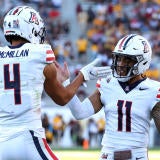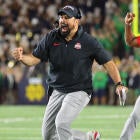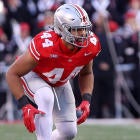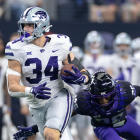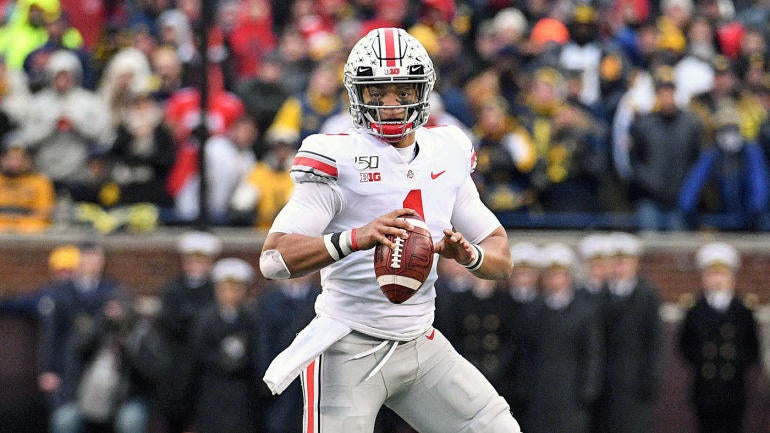
Trevor Lawrence was already a college football legend several times over to anyone who ever saw him spin the ball. But in a series of tweets sent Sunday night, Clemson's quarterback was elevated from star player to vocal leader.
In those tweets, Trevor Ballgame articulately expressed his willingness to play -- and the terms under which he wants to play. But Lawrence wasn't the only one. He was joined by many of his peers. Ohio State players (and their parents) weighed in with their support. It was as if we'd forgotten college football players love to play football.
#WeWantToPlay was born, tragically, as the 2020 college football season seems about to end.
Good for the players speaking their mind, but any argument over what appears to be a forthcoming decision not to play college sports this fall isn't about desire. Anything short of a players association to negotiate such things renders that argument moot.
This is about common sense.
This was an uphill battle that had to start with the realization this couldn't be about winning first. Medical professionals told us this was about getting the 130 FBS teams through the season healthy.
We know now that some of those players won't play. More than 30 Power Five players have opted out. The MAC and independent UConn have already canceled their seasons. All those decisions -- by players, teams and leagues -- have to be respected as well.
From the beginning, the return of college football was more likely to spread the coronavirus than stop it: Assemble 120 guys in a small space -- locker room, team meeting room, doesn't matter. That goes against every medical guideline out there.
Then let them scream, hit, sweat. Do it a combined 150 times over three hours in a game that one team has traveled to play.
Players want to play? No kidding. We all want college football to be played.
But it does not appear to be safe. Simple as that. And it won't be until the global pandemic is at least under some sort of control -- especially in the United States.
The universities look to ultimately be doing the right thing for their consciences and their bottom lines.
The same parents who are advocating to play were the ones who inevitably would have sued in a heartbeat if one of their sons -- God forbid -- was hospitalized.
The reason you don't let players dictate such a situation is because they are not considering all the risks.
America might need football, but first, it needs to defeat the coronavirus.
Hours after Lawrence's initial tweet wave, two sides joined hands and made salient points. #WeWantToPlay and #WeAreUnited released a joint statement Sunday calling for universal health protocols, a guaranteed season of eligibility whether an athlete plays this season or not, and the eventual creation of a college football players association.
#WeWantToPlay pic.twitter.com/jvQhE7noGB
— Trevor Lawrence (@Trevorlawrencee) August 10, 2020
We told you this might have at least gone smoother with both sides negotiating face to face.
Both these things can be true: (1) Players old enough to lay their lives down for their country in the military should be able to assume some risk in their playing careers. (2) Those charged with protecting these players should act with health and safety in mind, even if it's against the players' wishes.
Here we go with science again, kids, but there's also this: Statistically, 18-22-year-olds typically don't suffer serious COVID-19 symptoms. But that does not mean they are immune. And like anyone else, they can spread it to their families, their coaches, those who most vulnerable -- people compromised by other diseases, the obese and senior citizens.
In its latest medical guidelines, the NCAA said infected persons "of any age" with underlying heart conditions are a risk. There's at least one Power Five school where athletes who test positive automatically get an EKG.
Big 12 commissioner Bob Bowlsby told the AP on Sunday there was "growing evidence" of concern over myocarditis, an inflammation of the heart. Medical experts have told West Virginia athletic director Shane Lyons that moving to the spring "will give us more time to be able to understand if the virus does necessarily impact the heart."
Yeah, there's risk in everything.
But you don't choose car accidents. You wear your seatbelts. You turn your headlights on in a tunnel. You use, you know, common sense.
If football is safe enough to be played, why are stadiums being modeled for a fraction of attendance? Why are classes increasingly going virtual this fall?
There's another irony. College football culture was criticized for years for keeping players hermetically sealed in its own "culture," sequestered from campus life.
Now, some sort of bubble might be the only thing that saves the game from having to wait until next fall to play. The game would be best served keeping the players on campus as long as possible, surrounded by medical professionals and the best health care. Basically, on campus but sequestered from campus life.
The game's viability has nothing to do with the players' wishes to play or even the terms they want to play under. They want to play? Of course they do.
But it was always about the coronavirus.
The commissioners tried their damndest. So did the athletic directors.
Sometimes, it looked disjointed. Sometimes, it was disjointed.
The coronavirus didn't let go, and we didn't get rid of it.











